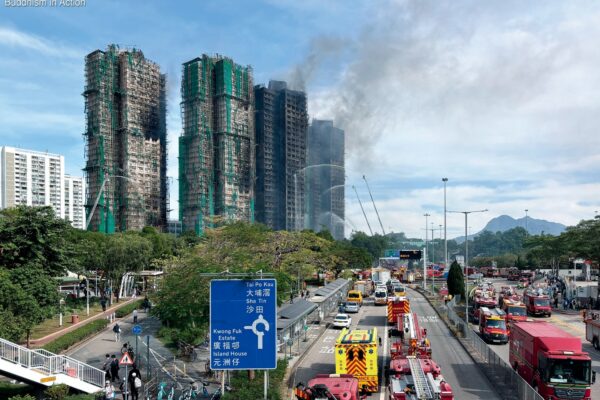Text and photos by Huang Xiao-zhe
Translated by Wu Hsiao-ting
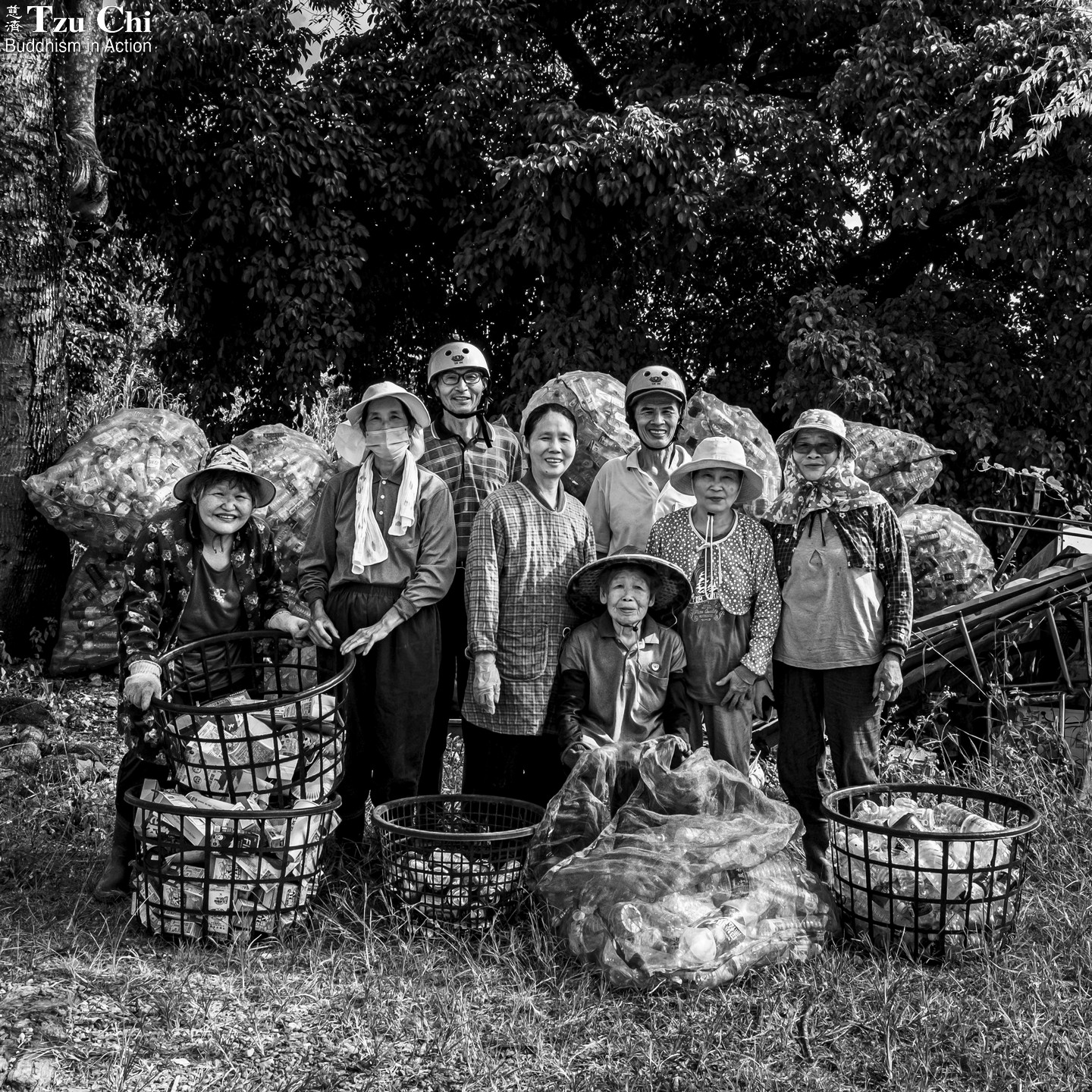
Volunteers at the Dongyuan Recycling Station pose for a group photo. From left: Liu Xiu-qin (劉秀琴), Wu Mei-yun (吳美雲), Zheng Qiu-yuan, Li Shu-zhu (李淑珠), Luo You-hui, Zheng Zong-zhi, Li Li-qin (李麗琴), and You Ye Min.
October 6, 2022, marked the first time I visited the Tzu Chi Dongyuan Recycling Station in Dongshan District, Tainan, southern Taiwan. This recycling station is situated in such an atypical location I couldn’t have found it if someone hadn’t shown me the way to it. Nestled in the mountains, it doesn’t have an address, nor are there any signs that point the way. The only “landmark” you can rely on to locate it is three shipping containers sitting alongside a mountain path leading to the recycling station. After passing the containers at a bend in the mountain path, you are there.
The recycling station is small and simply laid out: a single sorting area and two or three places for storing recyclables. Beyond that, it’s just trees and natural unpaved land covered by grass. I asked the volunteers there when they usually gather together to sort recycling. The station is located in the mountains, and the volunteers are scattered across nearby villages, but they said they make a point of taking half a day out of their weekly schedule on Thursday afternoons to come to the station and sort recycling.
My first visit there happened to fall on a Thursday afternoon. Since everyone was around, I decided to take advantage of my visit to record the people and their work at the station. When I gathered everyone for a group picture, I was surprised to discover there were fewer than ten volunteers at the station. Though they are a small “family,” they have kept the station going for 16 years.
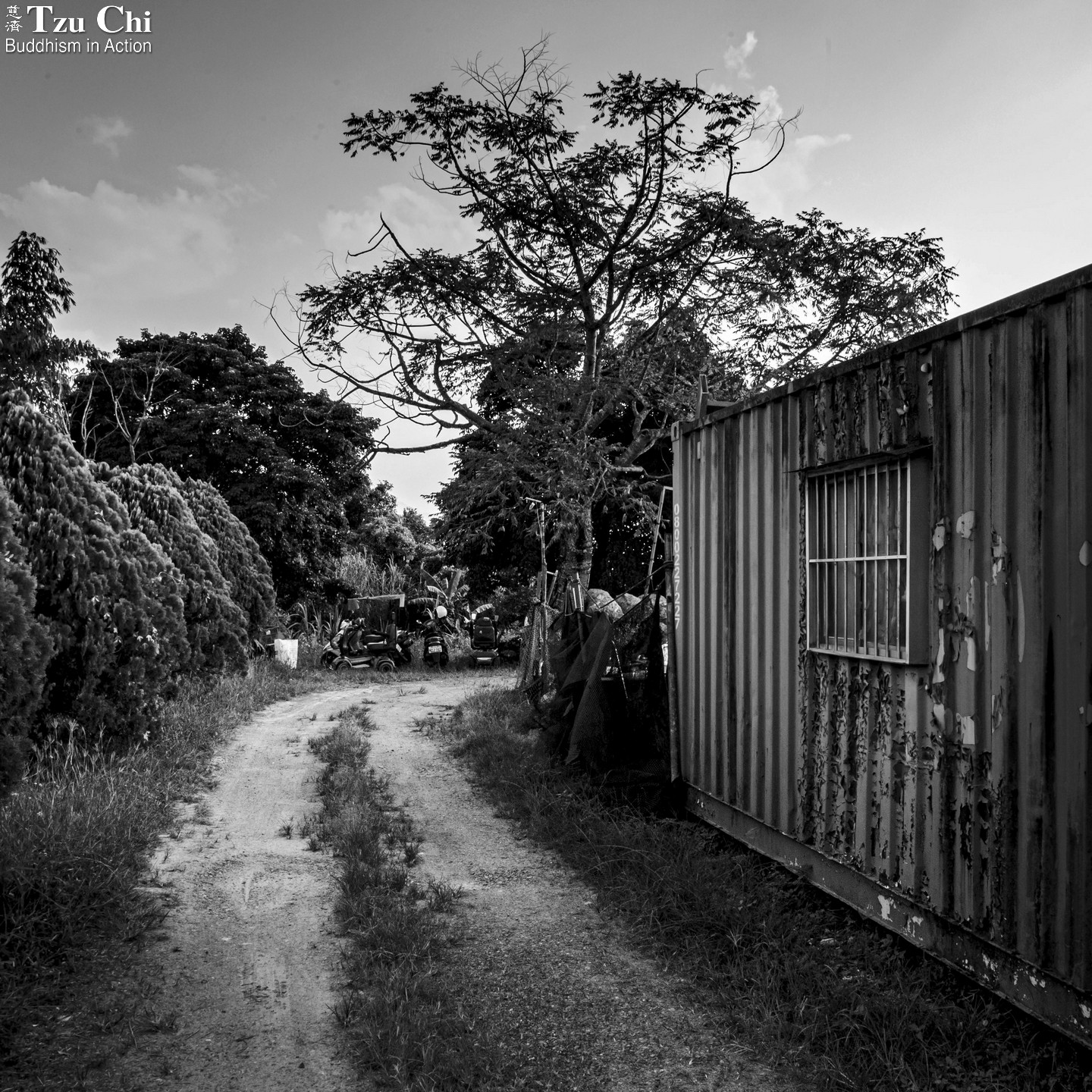
The Dongyuan Recycling Station doesn’t have an address, nor are there any signs leading to it. You arrive after passing the shipping containers pictured here at a bend in a mountain path.
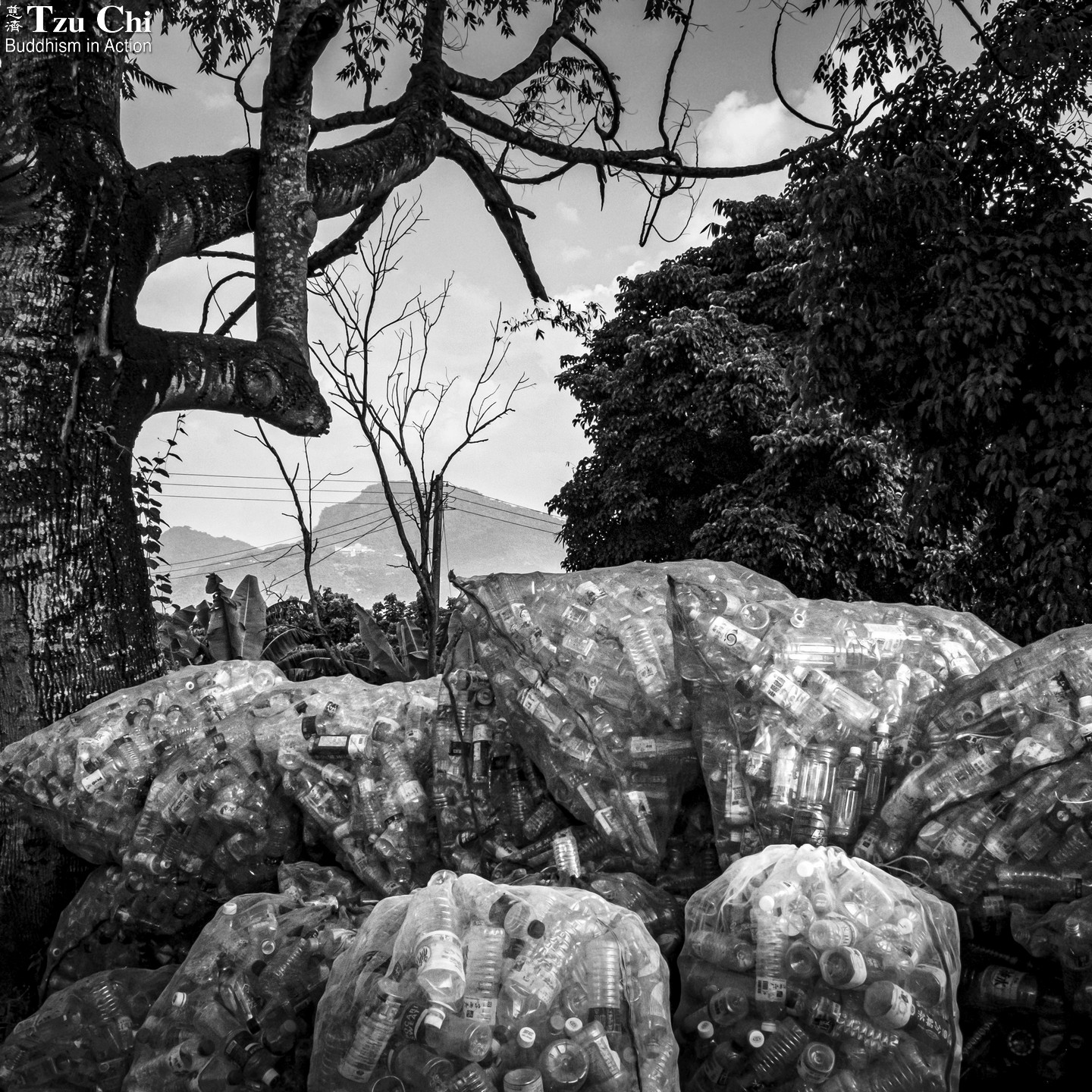
Upon entering the recycling station, you see several bags of plastic bottles under a tree, with a backdrop of mountains in the distance.
No Need for Words
Though the volunteers have only half a day per week to sort the recycling brought to the station, I saw that a lot of recycling was already there for them to work on. The amount of recyclables collected by volunteers from various collection points every week is enough to fill several 3.5-ton trucks. Since there is so much work to do with so few people to do it, the volunteers have worked out a system for their time together. One week they might focus on removing rings from the necks of PET bottles, the next they sort recyclables of miscellaneous kinds, and so on. Each week has its particular focus for the team.
Volunteers usually arrive right after noon on a typical weekly recycling day. Then the female volunteers take their seats amidst piles of unsorted recycling and get to work, while male volunteers load sorted recyclables onto trucks. The sound of sorted items tossed on their respective piles rises and falls throughout the afternoon. The volunteers have great chemistry. An unspoken understanding, forged over years of working together, has allowed them to work seamlessly. I learned later that they all have experience working on farms. As I watched them work, I was reminded of seasoned farmers sorting harvested crops together, each working briskly but in great tandem as a whole. No words are needed to coordinate their efforts.
No matter the amount of recyclables, volunteers make sure they finish sorting everything before dusk. The limited space at the recycling station makes it impossible to store large quantities of recyclables there. So volunteers can’t call it a day until they have transported the sorted recyclables down the mountain to recycling merchants.
Despite Age and Physical Limitations
If you don’t look closely, it is easy to miss her.
Wearing a bamboo hat, with a back bent 90 degrees as a result of osteoporosis and age-related degeneration, Luo You-hui (羅尤惠) can appear invisible as she quietly works amidst the small mountains of recyclables at the station. It’s difficult even to see her face. To do that, you have to bend lower than she does.
Luo, 90, is the oldest and most senior volunteer at the station. She started serving there as soon as it was set up 16 years ago. She is rarely absent on the weekly recycling day, even though she has to endure the aches and pains caused by the degeneration of her bones. With her badly curved spine, it is quite a challenge for her to stay seated for long stretches of time. She has to stand up from her stool every few minutes to give her aching back some relief before sitting back down and continuing her work. Despite her physical limitations and discomfort, the thought of quitting never crosses her mind. Her commitment comes from wanting to leave a better environment behind for future generations.
A Covenant
Six volunteers, working in pairs, are responsible for collecting recyclables from the collection points spread across various local villages and bringing them to the recycling station. The three pairs are Zheng Zong-zhi (鄭宗智) and Zheng Qiu-yuan (鄭秋源), You Jing-hui (尤景輝) and You Ye Min (尤葉敏), and Wang Chao-yong (王超永) and Chen Su-juan (陳素娟). Each team attends to different districts and routes.
On the afternoon of November 30, 2022, I tagged along while Zheng Zong-zhi and Zheng Qiu-yuan were making one of their rounds together. Only then did I realize the uneasy task they had taken upon themselves. It’s no piece of cake driving around winding, sinuous mountain roads making those collection trips, especially as the collection points are widely dispersed across a large area. They range from local residents’ homes, fruit processing factories, to vehicle maintenance shops, and more. We even visited a temple—the highest-elevation temple locally—to pick up their recycling.
Dongshan District, where the recycling station is, is a major producer of fruit. For convenience’s sake, many orchard farmers buy shop-sold beverages and bring them with them to drink when they go up into the mountains to work. Because of this practice, plastic bottles and Tetra Pak cartons account for the largest categories of recyclables among the items that volunteers collect. It is difficult to convince all the farmers to prepare their own drinking water instead of buying bottled beverages, so volunteers encourage them to recycle their bottles and cartons. This is at least better than throwing the containers away as garbage. Volunteers even provide large mesh bags into which the farmers can toss their bottles and cartons when they are empty. This helps prevent littering and serves to help the farmers make recycling a habit. In a way, the mesh bags are like a covenant between the volunteers and local residents to keep their homes cleaner.
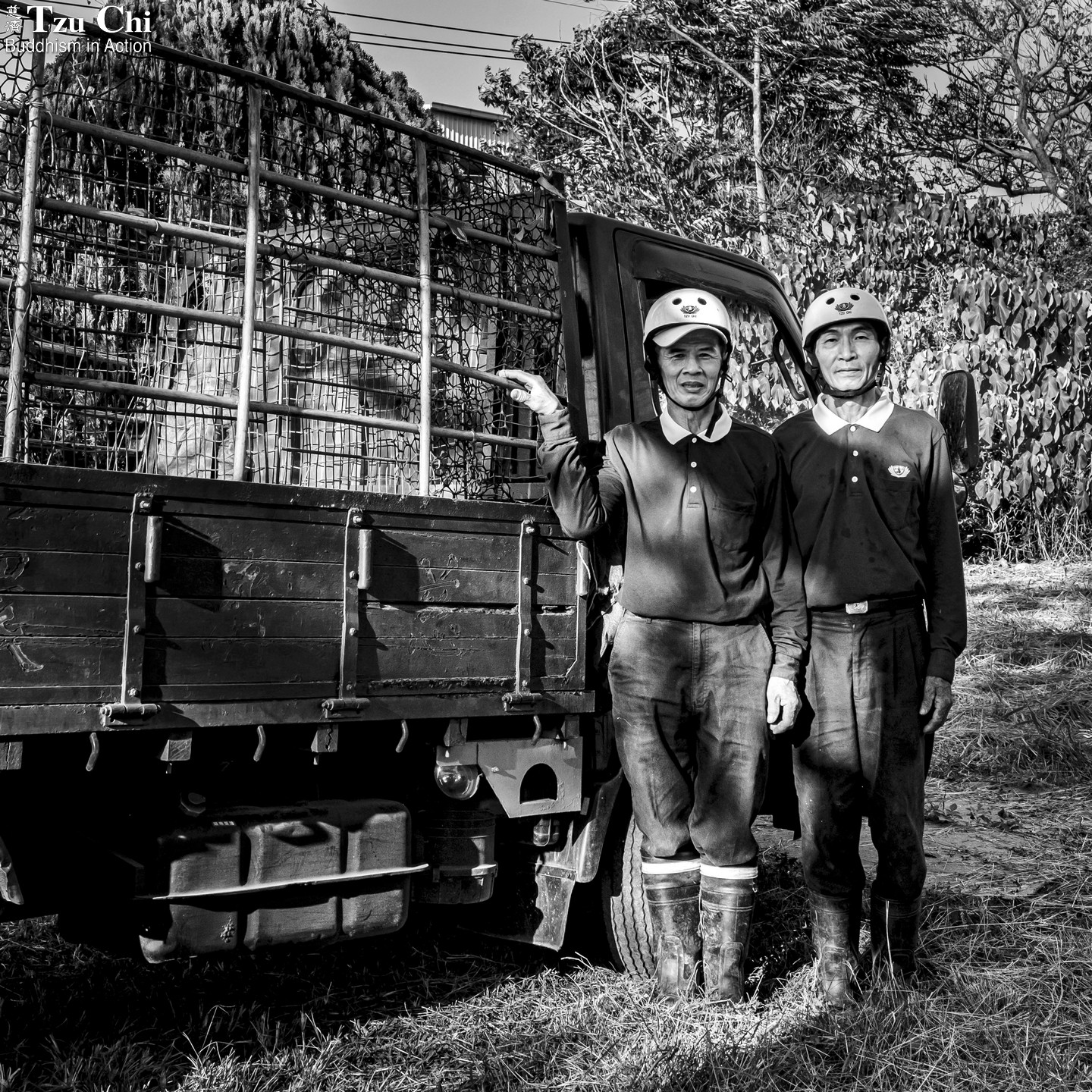
Zheng Zong-zhi and Zheng Qiu-yuan are relatives, and they work as a team to collect recyclables by truck.
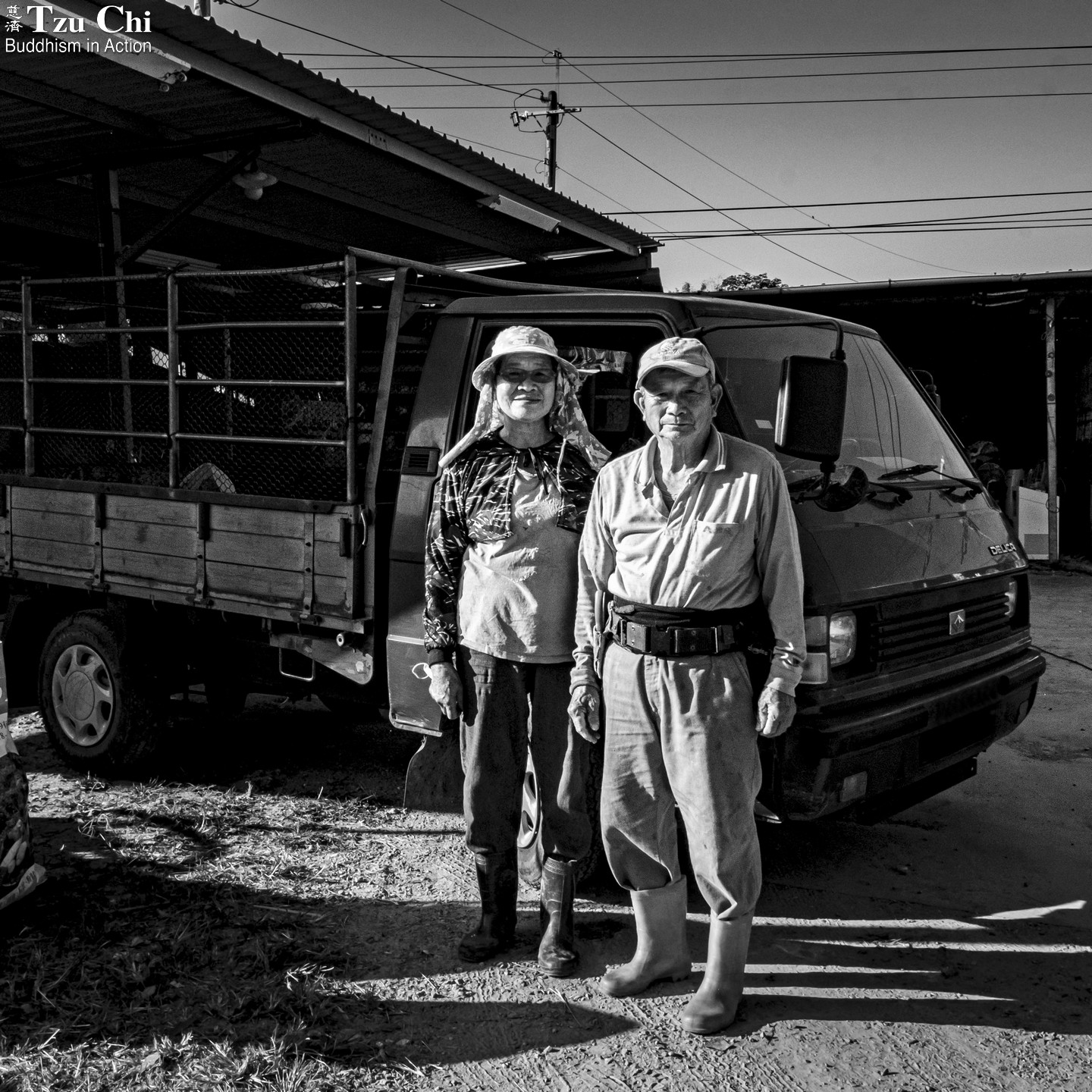
Husband and wife You Jing-hui and You Ye Min are usually busy with farm work, but they still make time to collect recyclables for the recycling station.
An Unwavering Course
It was near dusk. Volunteers picked up their pace to finish their work for the day before it became dark. There remained only a small amount of recycling to be sorted.
All of a sudden, I noticed that Luo was gone, no longer at her seat in the sorting area. I looked around for her and saw her slowly making her way to her mobility scooter, nicknamed “Mercedes-Benz.” When she reached the scooter, she held on to one of the armrests, then slowly straightened her badly curved spine until she stood tall. It was the first time I had seen her stand tall like that since we met. I was suddenly so moved. Noticing me looking at her, she smiled and said, “No worries. I’m just aching a little. I’ll be fine after a little rest.” Even though she said she was fine, everyone knew she had said that because she didn’t want others to worry about her. She was good at enduring pain.
As she stood beside her scooter, I caught her looking back at the recycling station, at everyone still working there. Her expression told me that despite her aches and pains, what she was most concerned about was still the recycling work at the station.
For 16 long years, Luo and her fellow volunteers have kept at their work, charting an unwavering course on their environmental mission. Limited manpower never holds them back, as they resolutely step up to the plate to help recycling be woven into the fabric of daily life. Standing side by side, they are working for a better future.
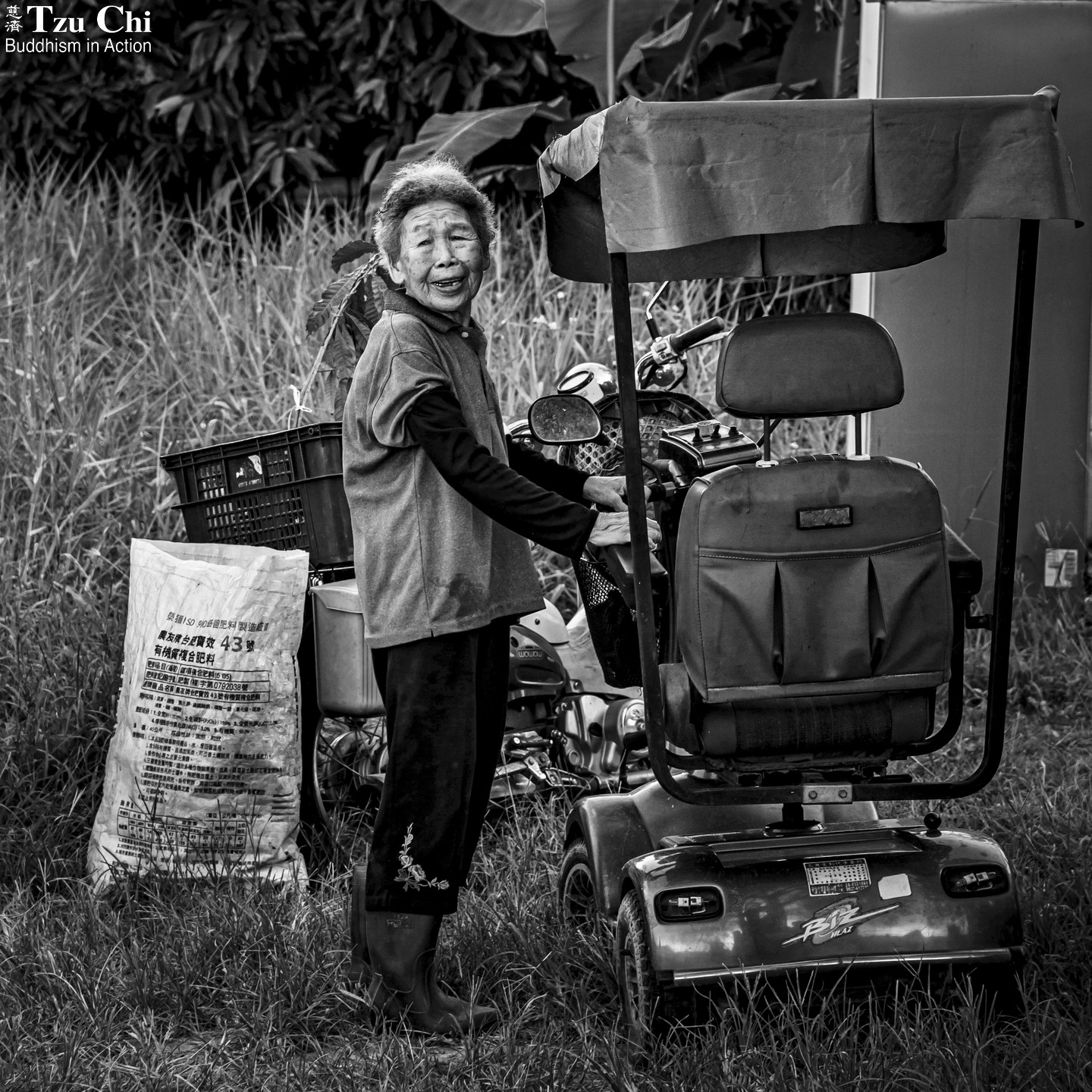
Luo You-hui straightens her badly curved spine and stands tall beside her mobility scooter.

